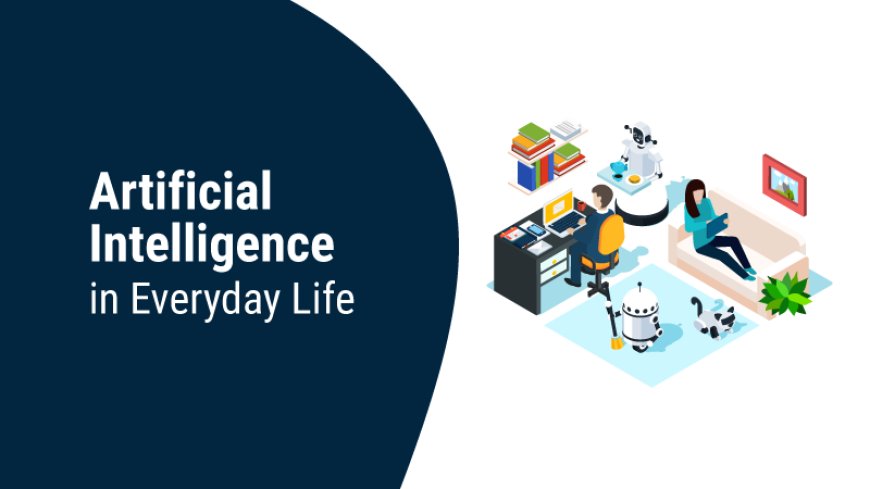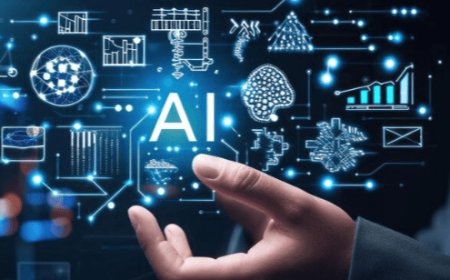Exploring the Impact of Artificial Intelligence Technology on Everyday Life
how AI technology influences daily routines & revolutionizes industries. Explore its impact on society, economy, & personal experiences.

Artificial Intelligence (AI) has seamlessly integrated into our daily lives, reshaping how we live, work, and interact. This transformative technology, while sparking curiosity, also raises concerns. Its impact is evident across various aspects of our routines, marking a significant shift in our societal scene. The widespread adoption of AI reflects its growing importance, emphasizing the need for a balanced exploration of its benefits and potential challenges.
AI's Delicate Integration into Our Daily Lives
In our journey through the 21st century, artificial intelligence has subtly become an integral part of our lives. Whether through virtual assistants or recommendation algorithms, its influence is pervasive. This silent integration into our daily routines is notable, as AI seamlessly operates in the background, often escaping conscious recognition. Understanding this reality requires acknowledging how AI has become an unobtrusive yet omnipresent force in shaping the fabric of our existence.
Handling the Privacy Dilemma: Balancing AI Effectiveness and Personal Information Protection
One of the complications arising from this integration is the blurred line between convenience and privacy. AI-powered devices, while enhancing efficiency, collect vast amounts of data, raising concerns about the security and privacy of personal information. The delicate balance between enjoying the benefits of AI and safeguarding our privacy becomes a critical consideration.
How has the growing reliance on AI changed how we perform everyday tasks?
The growing reliance on AI has transformed everyday tasks, streamlining processes and enhancing efficiency. From smart home devices automating chores to AI-powered personal assistants managing schedules, our routines have evolved, allowing us to accomplish more with greater convenience and speed.
Our routines have evolved from smart home devices automating chores to AI-powered personal assistants managing schedules
Let's examine each type a little more closely.
AI in Healthcare
In the domain of healthcare, AI has proven to be a boon. From diagnostic tools to personalized treatment plans, the integration of AI has significantly improved patient outcomes. However, the ethical question arises when considering the security of sensitive health data. Striking the right balance involves implementing robust data protection measures and stringent regulations to ensure the ethical use of AI in healthcare.
Education and AI
In education, AI is revolutionizing the learning experience. Personalized learning platforms leverage AI algorithms to adapt to individual student needs, fostering a more effective and tailored educational journey. Nevertheless, concerns arise regarding data ownership and the potential for algorithmic bias. Addressing these concerns requires transparency in algorithmic decision-making and the development of comprehensive frameworks that prioritize fairness.
AI in the Workplace
The workplace scenery is transforming with the integration of AI. Automation streamlines processes, allowing for increased efficiency, but the fear of job displacement is palpable. To answer this concern, reskilling and upskilling initiatives become imperative, ensuring that the workforce is equipped to travel around the evolving job market. Balancing the benefits of AI-driven productivity with the well-being of employees is a key consideration.
Social Interaction and AI
AI's impact on social interaction is evident in the algorithms that govern our online experiences. Social media platforms employ AI to curate content, influencing the information we encounter. The risk of living in echo chambers and the potential for the spread of misinformation highlight the need for responsible AI governance. Striking a balance involves promoting algorithmic transparency and empowering users to have more control over the content they consume.
Ethical Considerations
Ethical considerations loom large as AI becomes more ingrained in our lives. The ethical use of AI involves questioning not only how the technology is implemented but also the intentions behind its deployment. Establishing ethical guidelines and regulations becomes crucial to mitigate the risks associated with unchecked AI development.
The 10 Impacts of AI in Our Daily Lives
AI has been slowly infiltrating our daily lives, from the music we listen to to the food we eat, and even to the way we interact with our devices and the internet.
-
Voice assistants - AI-powered voice assistants such as Siri, Alexa, and Google Assistant have become a part of our daily lives, helping us with everything from setting reminders to controlling our smart home devices.
-
Smarter homes - Smart home devices such as thermostats, security cameras, and lights are being powered by AI to learn our preferences and adjust accordingly.
-
Personalized Experiences - AI is increasingly being used to provide personalized experiences to consumers, whether it's through targeted advertising, recommendations, or customer service.
-
Improved Healthcare - AI is transforming the healthcare industry, from diagnosing diseases to predicting outbreaks, and improving patient outcomes.
-
Increased Efficiency - AI is helping to automate tasks and processes, leading to increased efficiency in industries such as manufacturing, logistics, and transportation.
-
Enhanced Security - AI is being used to improve security, from facial recognition to identifying potential security threats.
-
Job Displacement - While AI is creating new job opportunities, it is also displacing some jobs that can be automated, leading to concerns about the future of work.
-
Education - AI is being used to improve education, from personalized learning programs to intelligent tutoring systems.
-
Improved language translation - AI is being used to improve language translation tools, making it easier for people to communicate across languages and cultures.
-
Fraud detection - AI is being used in finance and banking to detect fraud and protect against cyber-attacks.
What Opportunities Can We Expect from AI In the Future?
AI has the potential to revolutionize many industries and create new opportunities for innovation and growth. AI is being used in industries like healthcare, finance, and manufacturing to improve efficiency, reduce costs, and make better decisions. AI is projected to add $15.7 trillion to the global economy by 2030.
Some of the futuristic applications of AI include autonomous robots, virtual assistants, and smart cities. AI also has the potential to improve the way we work, by automating mundane tasks and enabling new levels of collaboration and creativity. The possibilities are endless, and the future of AI is sure to be an exciting one.
To take advantage of these opportunities, many individuals are pursuing an artificial intelligence and data science course or a data science and AI course to gain the skills and knowledge needed to work with AI and other emerging technologies.
The pervasive integration of AI into our daily lives brings both unparalleled convenience and ethical considerations. From healthcare to education, the workplace, and social interactions, AI's impact is profound. Balancing the benefits with privacy concerns and job displacement challenges us to go around this technological scenery responsibly. As AI continues to evolve, the opportunities for innovation are vast, promising a future where collaboration and creativity thrive. To seize these prospects, individuals are actively acquiring skills through AI and data science courses, positioning themselves to contribute to and shape the exciting trajectory of artificial intelligence.











































